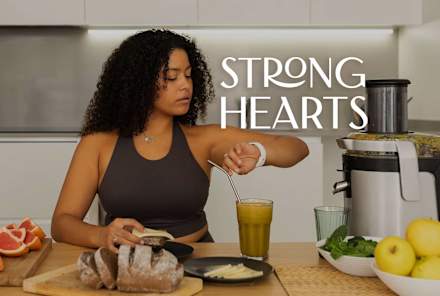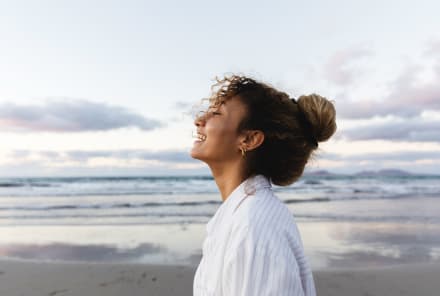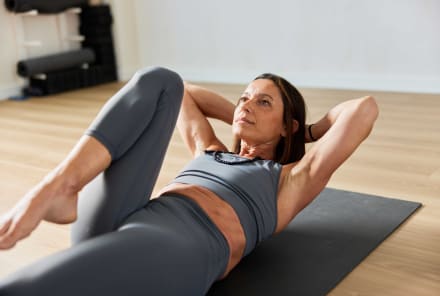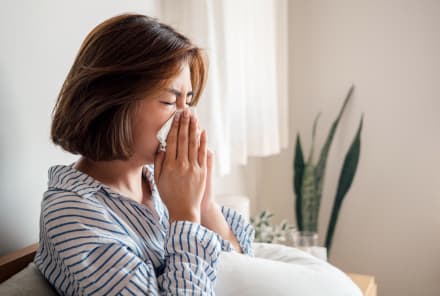Advertisement
Why Women Over 50 Need To Rethink Fitness

Whether you've already turned 50 or are on your way, there are some important challenges and rewards that come with staying fit after this milestone. As a 55-year-old competitive tennis player and Pilates fanatic, I'm familiar with longer recovery times, muscles that rebel, and more than my share of injuries. When I turned 40, my tennis friends got me a basket filled with first-aid supplies: ice packs, ointments, bandages, and pain relievers. Little did I know that I'd actually use all those items over the next decade!
My regular exercise routine of playing and competing at tennis wasn't going to cut it as I got older. I started to notice that running hard for a ball felt precarious, and I was plagued with strains and sprains. I learned the hard way that staying fit required more focus and creativity as I got older. The good news is that reaping the benefits of fitness over 50 is well worth the effort.
What should my fitness routine look like?
Most of us instinctively know that exercise is good for us, but finding the right training routine is critical to sticking with it. Endurance-training sports-medicine physician Jordan D. Metzl says that instead of prescribing a specific fitness regimen, he encourages his patients to find what works for them. "The ideal form of exercise for you is something you actually do!" Experts point out that we can derive major health benefits from exercising 150 minutes per week at moderate intensity or 75 minutes per week at high intensity. If you're just starting out, check in with a physician first; otherwise, we can all stay in the game and feel good as we age.
Here are 10 realities about fitness over 50 that might just inspire you to rethink your health and weight-loss strategy.
1. Don't exclude high-intensity exercise.
Aim for an exercise routine that combines moderate- and high-intensity workouts. High intensity means that you have difficulty talking while performing an exercise. This could be climbing stairs, jumping rope, sprinting, playing racquetball, or engaging in any number of other aerobic activities.
2. It takes longer to burn fat and build muscle as we age.
Many of us have already experienced this shift and have tried to modify our food intake accordingly—no fun! A workout routine that includes strenuous exercise is a great way to fight this harsh reality.
3. Recovery time is longer the older we get.
Be kind to your body. It's healthy to integrate strenuous exercise into your routine, but you need to space it out to allow for adequate recovery. Getting enough sleep helps with recovery as well.
4. Blend endurance, strength, and flexibility training.
A varied workout routine is not only more interesting but also much more important as we get older. When we're young, it's easier to get away with skipping one of these types of training. When trying to stay fit as we age, all three are important to maintain condition, stay strong, and avoid getting hurt while exercising.
5. Build muscle to avoid injury.
Adults lose between 5 and 7 pounds of muscle every decade after age 20. Recent research indicates that inactivity is responsible for the majority of muscle loss associated with age. Fortunately, resistance exercise can reverse much of this decline by increasing the size of shrunken muscle fibers. Strength training increases bone mass and density, which protects against osteoporosis, a disease that causes bones to become fragile and more likely to break. The American Journal of Medicine recently reported that folks with a higher muscle mass index live longer. So, get out there and lift some weights!
6. Stretch and exercise to maintain flexibility.
On days when you're recovering from more strenuous training, enjoy exercise that keeps your body limber and flexible. Structural integration practitioner Ruthie Fraser, the author of Stack Your Bones, emphasizes that stretching is key. "We lose height as we age, so a good daily exercise is to put a bolster under your shoulders and stretch backward over it, creating space and flexibility in your shoulders and spine." Getting older doesn't have to hurt. If you are strong and limber, you will feel 35, or even 20!
7. Treat yourself to massage and body work.
At this age, you've earned some pampering every now and then. Hardworking muscles deserve attention. Carianne Russo, who does restorative body work, explains, "As we age, soft tissue hardens. That's why massage and stretching are so important to folks over 50. Massage opens up the space that young people experience, and the body likes being in that space!"
8. Staying fit reduces anxiety and improves your mood.
It's well-known that exercise reduces our odds of developing heart disease, stroke, and diabetes—all diseases that become more common as we age. Exercise and fitness also release chemicals that improve mood and sleep and reduce anxiety. Aging can be stressful; exercise not only makes you look younger but also makes you feel better inside. This is especially important for those going through menopause or other life-changing events.
9. Exercise helps your memory.
As a developer of corporate health and fitness programs, Debi Conocenti is excited about new research that links exercise to enhanced memory and cognitive repair. Early studies on yoga and cycling reveal this important link. One study found that regular aerobic exercise appears to boost the size of the hippocampus, the brain area involved in verbal memory and learning. In fact, heart-pumping exercise "stimulates the growth of new blood vessels in the brain, and even the abundance and survival of new brain cells." So it's not just your muscles that work better by staying fit, but your brain, too!
10. Sitting is the new smoking, so keep moving!
Pilates guru Nicole Meadors Keegan knows that movement is necessary and healing. "I've been teaching Pilates for the last 13 years and have learned a lot about human nature and the mental gymnastics required to exercise. My students teach me about aging with grace. One of my clients is 90. I've taught him twice a week for the last decade. Mentally, he is resilient and investigative. Although he has moments of frustration, he is understanding of his body. He is hopeful and steady. These are the best qualities for the active aging process: Get there at least twice a week, show up, stay positive, and accept all of the seasons in life."
A regular fitness regime is a challenge worth taking for your long-term physical and mental well-being. Feeling vibrant and strong doesn't have to be just for the young. You've got this!


















